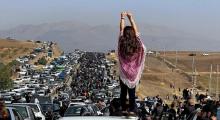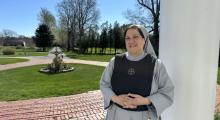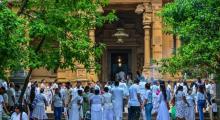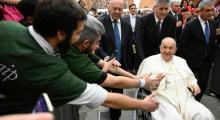Issued by the Catholic Center for Studies and Media - Jordan. Editor-in-chief Fr. Rif'at Bader - موقع أبونا abouna.org
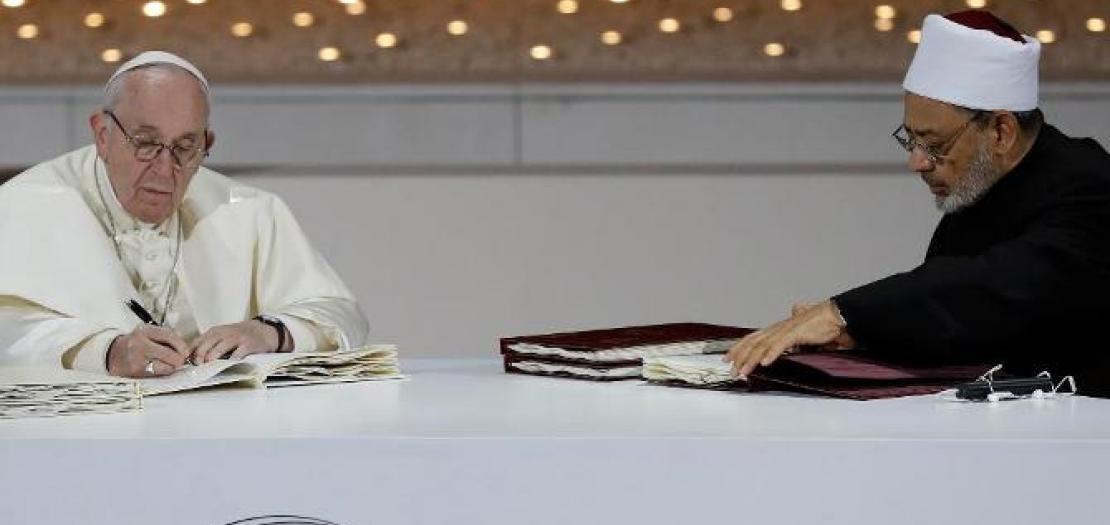
The clear and concrete statements of the document on "Human Fraternity" signed by the Pope and the Grand Imam of al- Azhar go beyond the tangle of misunderstandings, resentments, ideological traps that had tormented the season following Ratzinger's famous speech in 2006.
The Second Vatican Council said that the Church honors and esteems Muslims who "try to submit with all their heart to God's decrees", and "await the day of judgment, when God will benefit all resurrected men and women". According to a tradition guarded by Damascene Muslims, Jesus will appear on a minaret in the great Mosque of Damascus on the day of his return, when he will come to defeat the Antichrist, proclaim the end of time and divide the good from the ungodly. Meanwhile, before then, the Church of Rome continues to periodically recalibrate its attitude before the multitude of prayers that venerate God according to the Koran. It has continued to do so in the decades marked by the emergence of political Islam, and after the long bloody season of jihadist perversion. It does so because - as Jesuit Paolo Dall'Oglio repeated, before being kidnapped - it sensed that "Islam is not a temporary, nor ephemeral phenomenon", and its persistence in history has to do with the Last Days and with the promise of salvation made by God to every man and woman.
The Abu Dhabi Declaration on Human Fraternity, co-signed by Pope Francis and the Grand Imam of al Azhar, marks an important attempt - like it or not - to reconnect paths of sharing and proximity between the baptized and the members of Muhammad 's Ummah - in concrete historical contexts - for the benefit of the entire human family. The two co-signatories themselves seem to be aware of this, judging by the solicitude with which both the Bishop of Rome and Sheikh Ahmed al Tayyeb encourage us us to study the document in schools, universities and in political "decision-makers" circles.
Beyond Regensburg
The document signed by the Pope and the Great Imam states, among other things, that God "created all human beings equal in rights, duties and dignity"; He gave them freedom, by "creating them free", and for this reason "Freedom is a right of every person: each individual enjoys the freedom of belief, thought, expression and action"; recognizing that among the main causes of the crises of the modern world there is "a desensitized human conscience, a distancing from religious values and a prevailing individualism accompanied by materialistic philosophies that deify the human person and introduce worldly and material values in place of supreme and transcendental principles", and that precisely this context contributes to a general feeling of frustration, isolation and desperation leading many to fall either into a vortex of atheistic, agnostic or religious extremism, or into blind and fanatic extremism, which ultimately encourage forms of dependency and individual or collective self-destruction". It is hoped that the "awakening of the religious awareness" will be revived "in the hearts of the new generations", and it is precisely this awakening that is perceived as an embankment to “confront tendencies that are individualistic, selfish, conflicting, and also address radicalism and blind extremism in all its forms and expressions".
The Document states that religions “must never incite war, hateful attitudes, hostility and extremism, nor must they incite violence or the shedding of blood", blaming “a deviation from religious teachings" as a result “from a political manipulation of religions and from interpretations made by religious groups who, in the course of history, have taken advantage of the power of religious sentiment in the hearts of men and women in order to make them act in a way that has nothing to do with the truth of religion”. The Document repeats that "God, the Almighty, has no need to be defended by anyone and does not want His name to be used to terrorize people" and denounce the "incorrect interpretations of religious texts " along with "policies linked to hunger, poverty, injustice, oppression and pride".
With this string of clear and concrete statements, the document signed by the Successor of Peter and by the greatest exponent of the main Sunni theological center bypasses the tangle of misunderstandings, resentments, ideological traps that had tormented the season following Pope Ratzinger's famous speech in Regensburg, in September 2006, containing a cultured quotation that was perceived by Islamic sectors as offensive to the Koran. Then, the speech of the Pope-theologian became easy hostage to the foments of the "cultural wars", proper of those keyboard warriors fuelling the bitter confrontation with Islam, who, playing along with the angry reactions of Islamic circles, transformed it into a sort of theoretical manifesto of the clash of civilizations, or at least into a pretext for re-proposing their theses on the intrinsically violent nature of the Koranic faith and on its incompatibility with the modern principles of religious freedom, with the protection of human rights and with the models of pluralist societies.
Benedict XVI himself tried in every way to clarify that the lectio magistralis in Regensburg - as Cardinal Secretary of State Tarcisio Bertone explained in an article on 30giorni - had as its specific focus the relationship between faith and reason and between religion and violence, "and not the deepening of the issue of dialogue with other religions and with Islam in particular".
The Bavarian Pope also spoke at a meeting convened with the ambassadors of the countries with an Islamic majority, to repeat that he considered dialogue and collaboration between Christians and Muslims to be a "vital necessity", for the benefit of "the whole of humanity", to "build together that world of peace and fraternity so ardently desired by all men and women of good will".
In the wake of that stormy season, in October 2007, the Vatican also received a letter sent to the major Christian leaders by 138 eminent Islamic personalities, questioned over the authentic sense of Ratzinger's speech in Regensburg, who proposed identifying a "common ground" for dialogue and collaboration between Christians and Muslims, starting from the shared traits of love for the one God and for one's neighbor. The confrontation sought by the Muslim representatives developed in the subsequent meetings of the so-called "Islamic-Catholic forum". And today, freed from the ideological siege of the "cultural warriors", the same seeds of encounter and collaboration cultivated after the Regensburg storm can be found in the Abu Dhabi declaration. Written together with the Pope by the greatest representative of the most authoritative Sunni theological center, to attest that "faith leads the believer to see in the other a brother, a sister to support and love".
The new frontiers of "critical thinking"
The Western polemic against Islam has various degrees. Alongside the theorists of the intrinsically violent nature of the Koranic faith, there are also the soft versions that reproach Islam for its alleged incompatibility with tolerant, plural modernity, respectful of individual rights.
Pope Francis never took the posture of Islam's "great tutor", called upon to encourage its adaptation to multicultural and multi-religious modernity. The Pope and his collaborators never even intended to be taken for those who want to "school" Islam. The bishop of Rome is well aware that it doesn't fall within his competence to stand as promoter of the "maieutics method" of the albeit desirable "Enlightenment" reform of Islamic culture. And perhaps precisely for this reason the Abu Dhabi document presents itself as a map shared without reservations and resistance on the part of Islam also on how to walk together and live the faith in God in the current world order. At the same time, without proclaiming new Crusades and new Holy Wars, the document signed with the Great Imam also reaffirms a substantial harmony of intent in the custody of the Natural Law. As already happened in the 'nineties, at the time of John Paul II, when the Holy See and the Islamic countries united against abortion policies at the UN conferences in Cairo (1994) and Beijing (1995).
In the jointly signed text, Pope Francis and the Imam at Tayyeb repeat that “situations of injustice and lack of equitable distribution of natural resources – which only a rich minority benefit from, to the detriment of the majority of the peoples of the earth – have generated, and continue to generate, vast numbers of poor, infirm and deceased persons, causing catastrophic crises"; that family “is the fundamental nucleus of society and humanity” and how it is “essential in bringing children into the world, raising them, educating them, and providing them with solid moral formation and domestic security”. That life is a gift from the Creator "that no one has the right to take away, threaten or manipulate to suit oneself", and must be safeguarded "from its beginning up to its natural end", and therefore “condemn all those practices that are a threat to life such as genocide, acts of terrorism, forced displacement, human trafficking, abortion and euthanasia, along with the policies that promote these practices". Thus, without fearing to expose themselves to accusations of obscurantism, the Pope and the Imam experience the rediscovery of fraternity amid children of God also as a reserve of critical thought towards the new individualist and liberal idolatries that flood our globalization era.


